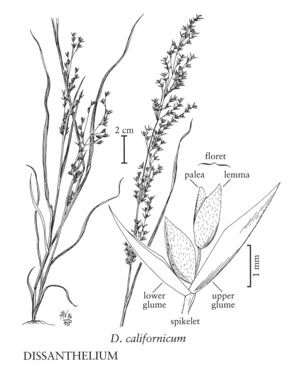familyPoaceae
subfamilyPoaceae subfam. Pooideae
tribePoaceae tribe Poeae
genusDissanthelium
speciesDissanthelium californicum
Difference between revisions of "Dissanthelium californicum"
Common names: California dissanthelium
Treatment appears in FNA Volume 24. Treatment on page 700.
imported>Volume Importer |
imported>Volume Importer |
||
| Line 39: | Line 39: | ||
|publication year= | |publication year= | ||
|special status= | |special status= | ||
| − | |source xml=https:// | + | |source xml=https://bitbucket.org/aafc-mbb/fna-data-curation/src/2e0870ddd59836b60bcf96646a41e87ea5a5943a/coarse_grained_fna_xml/V24/V24_991.xml |
|subfamily=Poaceae subfam. Pooideae | |subfamily=Poaceae subfam. Pooideae | ||
|tribe=Poaceae tribe Poeae | |tribe=Poaceae tribe Poeae | ||
Revision as of 21:54, 5 November 2020
Plants annual. Culms to 25 cm, glabrous. Blades 2.5-15 cm long, 1-4 mm wide, flat, soft. Panicles 5-15 cm, contracted; pedicels scabrous. Spikelets with 2-3 florets, lower floret in each spikelet a little longer than the upper floret. Glumes sub-equal, 3-4 mm, exceeding the florets, lanceolate, keels scabrous, margins scarious, apices acuminate; lemmas 1.5-2 mm, pilose, obtuse to acute. 2n = unknown.
Discussion
Dissanthelium californicum is known only from Santa Catalina and San Clemente islands, California, and Guadalupe Island, Baja California, Mexico. It grows in coastal sage-scrub. Until its rediscovery on Santa Catalina Island in 2005, it was thought to be extinct in California, not having been reported from the state since 1903.
Selected References
None.
Lower Taxa
None.
